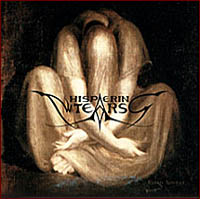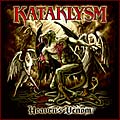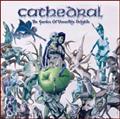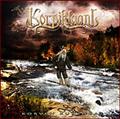WHISPERING TEARS (FRA) - Esprit Souillé (2007)

Label : Auto-Production
Sortie du Scud : 1 avril 2007
Pays : France
Genre : Death Metal
Type : Démo
Playtime : 4 Titres - 20 Mins
Un artwork travaillé, sombre et mélancolique, un digipack extrêmement soigné, est-ce bien une démo que je tiens dans les mains ? Cela ressemble pourtant à un véritable travail professionnel tout ça. Et donne déjà envie d’aller plus loin dans la découverte. Les premières notes de « Froide Désillusion », en arpège clair, pesant, qui se muent en riffs puissant et dévastateur présagent d’un moment singulier, inoubliable que l’on va passer en compagnie de WHISPERING TEARS. La première impression est vraiment excellente. Qu’en est-il du reste de l’écoute ?
Elle confirme cette impression. WHISPERING TEARS ne pense pas jouer dans la cour des grands. Ce groupe y est déjà, même si les grands ne le savent pas encore. Ils sont là, bien là, et produisent un Death Metal couillu, torturé et technique qui met une grande claque dès la première fois. Bien sûr, absorber toutes les subtilités des morceaux demande un plus grand nombre d’écoutes mais ils arrivent malgré tout à se faire comprendre pour le novice qui n’est pas encore initié à leur Grand Œuvre. Par contre, je met en garde les gars qui auraient un logement uxorilocal… vous risquez de vous faire virer à l’écouter en boucle… mais saurez-vous vraiment résister à cette envie irrépressible qui va vous assaillir ?
Les compositions sont riches, variées et servies par la grande technicité des musiciens. Celle-ci sert parfaitement les morceaux sans jamais chercher à aller plus loin qu’il ne le faut. Pas de débordement pédant, juste une maîtrise parfaite de ce qu’il y a à jouer. Le chant aussi est parfaitement intégré. Alliant une voix gutturale et parfois plus criarde Black, Eric sait passer de l’une à l’autre sans aucun dérapage. Et cette voix cadre parfaitement avec les textes qui parlent de la profonde douleur de la vie dans le monde dans lequel nous vivons. D’autres thèmes plus délicats sont abordés, comme la violence sexuelle, sans aucun voyeurisme, mais plutôt avec une sensibilité saignante qui prend aux tripes.
Enregistré et produit par le groupe lui-même, Esprit Souillé est aussi un bel exemple d’autoproduction réussit. Le son est irréprochable, le mixage parfait. Tout comme le packaging, ils n’ont pas fait les choses à moitié et assurent à tout le monde qu’ils ont la volonté et la carrure pour entrer dans le monde « professionnel ». Mais ne le sont-ils pas déjà finalement ?
Ajouté : Mercredi 09 Mai 2007
Chroniqueur : Wong Li
Score :     
Lien en relation: Whispering Tears Website
Hits: 15649
|














